7 Krill Oil Benefits, How It Works, And Side Effects
Know all about this underrated yet perfect substitute for fish oil that you can use in varied ways.
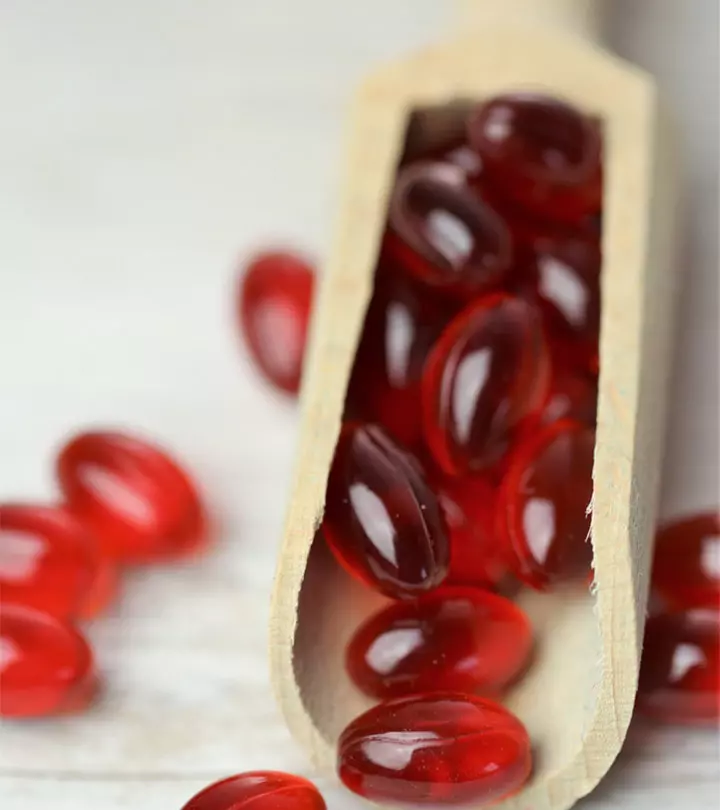
Image: Shutterstock
Krill oil is a perfect substitute for fish oil. The benefits of krill oil are numerous, ranging from combating inflammation to promoting heart and skin health. The oil is also known to improve the metabolic rate of the body and aid in weight loss. It is a rich source of omega-3 fatty acids. Krill oil is mostly available in the form of capsules that are used as supplements.
This article explores the health benefits of krill oil, how it works, the safety precautions to consider, and its potential side effects. Read further.
In This Article
What Is Krill Oil?
Krills are tiny crustaceans similar to shrimps. These belong to the Euphausia superba species that resemble the Antarctic krill family.
These live in colder ocean waters and are a staple for many animals like whales and penguins.
 Did You Know?
Did You Know?Krill oil is a dietary supplement usually made from processed krill. It contains phosphatidylcholine (phospholipid-derived fatty acid) and omega-3 fatty acids similar to those in fish oil.
Krill oil has important benefits. Here, we bring to you a list of the seven science-backed health benefits of krill oil.
 Did You Know?
Did You Know?Key Takeaways
- Krill oil is rich in omega-3 fatty acids and contains astaxanthin, which is known for its antioxidant and anti-inflammatory properties. The compound benefits the skin too.
- This oil may also help treat degenerative joint diseases and relieve mild knee pain in adults.
- Ingesting it may result in a few side effects like bloating, diarrhea, etc.
7 Science-Backed Krill Oil Benefits
1. May Reduce Inflammation
Krill oil contains astaxanthin, a carotenoid with antioxidant and anti-inflammatory properties. Astaxanthin prevents krill from turning rancid and reduces the production of inflammation-causing molecules in human cells. A study found that krill oil is more effective than fish oil in reducing severe intestinal inflammation and pain in mice. It is said to improve epithelial barrier and increase cell survival (1),(2).
2. May Promote Cardiovascular Health
Krill oil contains essential omega-3 fatty acids that may promote cardiovascular health. The oil was found to decrease total cholesterol levels (including the bad LDL cholesterol) and increase HDL (good) cholesterol. A high dose of krill oil was also shown to decrease triglyceride (a type of fat) levels in the blood (3). However, the cardiovascular benefits of krill oil remain unproven and need further research. Another study suggests that this oil may reduce the risk of cardiovascular disease, specifically endothelial dysfunction, in patients with type 2 diabetes (4).
As stated, krill oil may help lower total and LDL cholesterol levels. According to a study, this oil may effectively manage hyperlipidemia (high fat levels in the blood) by reducing total cholesterol, LDL, and triglyceride levels, and increasing HDL levels. In fact, krill oil was found to be more effective than fish oil in lowering glucose, triglyceride, and LDL levels (5).
According to the data from two randomized clinical trials including 520 people with high triglyceride levels, the natural krill oil containing both free fatty acids and phospholipids can help reduce triglyceride levels. The treatment group using krill oil saw a 26% reduction in triglyceride levels after 12 weeks, compared to a 15% reduction in the placebo group using cornstarch.
However, the cardiovascular benefits of krill oil need further research.
3. May Reduce Arthritis Pain
Krill oil offers substantial anti-inflammatory protection. It protects cartilage (soft tissue in the joints) from damage and may potentially treat osteoarthritis (6),(7). A study indicates that administering krill oil (2 g/day for 30 days) may reduce mild knee pain in adults and reduce stiffness (8). Moreover, rats supplemented with krill oil experienced lower arthritis scores and reduced hind paw swelling (9).
4. May Help Manage PMS
Krill oil is high in omega-3 and may significantly reduce dysmenorrhea (painful menstrual periods) and the emotional symptoms of premenstrual syndrome. It is shown to be more effective than omega-3 fish oil in the management of PMS (10).
5. May Promote Skin Texture
Several studies support the health benefits of omega-3 phospholipids for skin (11). Consuming krill oil may improve skin texture, thanks to its astaxanthin content. Astaxanthin has powerful antioxidant activity, and its unique properties may help treat and prevent skin diseases. Further, this oil enhances the elasticity, hydration, and topography of the skin (12).
6. May Help Treat Dry Eye
Researchers found that consuming krill oil for about three months may alleviate dry eye symptoms like redness and unstable tear films. Consuming phospholipid, a form of omega-3 fatty acid present in krill oil, was found to reduce tear osmolarity and increase tear stability in people with dry eye (13).
7. May Promote Weight Loss
Consuming krill oil may help accelerate metabolism. Supplementing it in mice fed a high-fat diet for 10 weeks was found to reduce weight gain. Intake of this oil may also potentially help with weight loss (14).
All these benefits of krill oil are amazing. However, what good are these benefits if you do not know how to add the oil to your diet? Learn how to do so in the next section.
How To Take Krill Oil?
You can consume a krill oil capsule with water right after your breakfast. If you often tend to eat a light breakfast then you can also wait till lunch before taking krill oil. However, it is recommended that the meal should contain dietary fat to increase the absorption of DHA and EPA, present in the oil (15). Anecdotal evidence suggests that it may also decrease the risk of gastrointestinal discomfort like acidity. Some people also split their krill oil dosage into two and take it with separate meals to reduce gastrointestinal discomfort.
Josh Corn, a blogger, has tried fish oil and krill oil and shares his experience in a blog post. He says “Personally, I take both fish oil and krill oil daily, and have experienced tremendous health benefits from doing so. My joint discomfort has gone down since adding krill and I like knowing I’m getting the trusted and proven health benefits of fish oil (i).”
Krill oil is rich in antioxidants and omega-3 fatty acids. But how do they act to exert beneficial effects on your body? Keep scrolling to know.
How Does Krill Oil Work?
The fatty acids in krill oil are similar to those found in fish oil. These fats may reduce swelling, lower cholesterol, and make blood platelets less sticky. Blood platelets are less likely to clot when they are less sticky.
Long-chain omega-3 fatty acids (found commonly in fatty fish like salmon, herring, and trout) effectively lower plasma triglyceride levels (TG). Several mechanisms contribute to the overproduction of TG, but one of the most important factors is the increased availability of fatty acid in the liver. The liver obtains fatty acid from dietary sources, de novo lipogenesis (a metabolic pathway), and circulating non-esterified FAs (NEFAs) or free fatty acids. Krill oil intake reduces the rate at which very low-density lipoprotein (VLDL) is synthesized in the liver.
NEFAs contribute the largest fraction to VLDL-TG production. Consuming krill oil may reduce NEFAs in the liver. This oil also counteracts the lipolytic release of NEFAs from adipose tissue by suppressing inflammation. Besides, it increases fatty acid uptake and oxidation in the adipose, heart, and skeletal muscles (16).
Krill oil is generally safe for most people when consumed in moderation. However, it may show a few undesirable side effects in some people (17). Continue reading to know them.
Krill Oil Side Effects
1. Stomach Upset
Anecdotal evidence suggests that consuming large amounts of krill oil may cause abdominal cramps and stomach ache. Its high-fat content may also trigger indigestion, nausea, and vomiting. The adverse taste of krill oil also results in fishy burps.
2. Decreased Appetite
Consuming krill oil may reduce appetite. Its effect on digestion may lead to nausea, which reduces satiety. However, quality research is warranted in this aspect.
3. Bloating
Consuming krill oil on an empty stomach may increase the risk of bloating. Gas forms in the stomach when the fatty acids present in krill oil stimulate gastric acid secretion. As a result, your body may bloat and gasp.
4. Diarrhea
Consuming high amounts of krill oil or its supplements may cause diarrhea. The same was observed when omega-3 fatty acid supplements were consumed in excess. People complain about loose stools after adding krill oil to their diets. However, diarrhea may also result from an allergic reaction or exposure to contaminated or expired oil.
Most of these side effects subside on their own once you reduce or stop the intake of krill oil. Consult your doctor if any of these symptoms become severe.
Let us understand what safety precautions you must consider before consuming krill oil.
Special Precautions And Warnings
- Follow the directions on the label or those given by your doctor when taking krill oil.
- Do not take it in larger amounts or for longer than recommended.
- Do not take it if you have a seafood allergy.
- Avoid using it during pregnancy and breastfeeding. Consult your doctor for more information.
- Ask a doctor or pharmacist about using it if you have diabetes, liver disease, a pancreas disorder, blood clotting disorder or stroke, an upcoming surgery or procedure that might increase your risk of bleeding, an underactive thyroid, or if you drink more than two alcoholic beverages per day.
- Check the label for any other active or inactive ingredients that may cause an allergic reaction.
- Stop taking krill oil at least two weeks prior to any scheduled surgery or procedure.
How does krill oil compare with fish oil? Here are a few differences that you should know.
Krill Oil Vs. Fish Oil: Key Differences
| Krill Oil | Fish Oil |
| Derived from tiny crustaceans | Extracted from fatty fish |
| Contains omega-3 fatty acids and astaxanthin (antioxidant) | Contains omega-3 fatty acids |
| Contains EPA and DHA as phospholipids and triglycerides | Contains EPA and DHA mainly as triglycerides |
| Cheaper | Very expensive |
The benefits of krill oil are many. It can effectively combat inflammation thanks to its astaxanthin content. The omega-3 fatty acids in krill oil can promote cardiovascular health. This oil also increases HDL cholesterol and effectively decreases LDL cholesterol levels. This oil also reduces arthritis pain, helps manage PMS symptoms, promotes skin texture, and helps treat dry eyes. In addition, krill oil accelerates metabolism and promotes weight loss. However, if consumed in excess, it may cause side effects like stomach upset, decreased appetite, bloating, and diarrhea. Hence, moderate consumption is advised.
Frequently Asked Questions
How long does it take for krill oil to work?
It may take anywhere between 6 weeks to 6 months to notice a significant difference.
Does krill oil help hair growth?
Yes, krill oil supplements can benefit your hair health as the fatty acids help strengthen the hair follicles and nourish the dry scalp.
Is 1000 mg of krill oil too much?
No, 1000 mg of krill oil daily is safe in most cases with no side effects.
Is CoQ10 and krill oil the same?
No, Krill oil has naturally occurring omega-3 essential fatty acids. At the same time, CoQ10 is more of a vitamin-like compound, which affects cellular energy production and helps support heart health.
Does krill oil have vitamin D?
Yes, krill oil is rich in all fat-soluble vitamins A, D, and E.
Is krill oil good for kidneys?
Not enough research is available to establish how krill oil may affect the kidneys.
Can you take krill oil and vitamin D together?
Yes, krill oil and vitamin D can be taken together as the oil supplement enhances better absorption of vitamin D and its beneficial effects.
Learn about the advantages and uses of this small crustacean, abundant in the ocean, that surpasses other animals in terms of its omega-3 content. Discover how it can contribute to a range of health benefits in this informative video!
Personal Experience: Source
StyleCraze's articles are interwoven with authentic personal narratives that provide depth and resonance to our content. Below are the sources of the personal accounts referenced in this article.
(i) Fish Oil or Krill Oil…That is the Questionhttps://healinghealthandwellness.wordpress.com/2016/09/28/fish-oil-or-krill-oilthat-is-the-question/References
Articles on StyleCraze are backed by verified information from peer-reviewed and academic research papers, reputed organizations, research institutions, and medical associations to ensure accuracy and relevance. Read our editorial policy to learn more.
- Anti-pain and anti-inflammation-like effects of Neptune krill oil and fish oil against carrageenan-induced inflammation in mice models: Current status and pilot study
https://www.ncbi.nlm.nih.gov/pmc/articles/PMC6488718/ - Krill oil reduces intestinal inflammation by improving epithelial integrity and impairing adherent-invasive Escherichia coli pathogenicity
https://pubmed.ncbi.nlm.nih.gov/26493628/ - Krill Oil for Cardiovascular Risk Prevention: Is It for Real?
https://www.ncbi.nlm.nih.gov/labs/pmc/articles/PMC4252213/ - Effects of krill oil on endothelial function and other cardiovascular risk factors in participants with type 2 diabetes a randomized controlled trial
https://www.ncbi.nlm.nih.gov/pmc/articles/PMC4611487/ - Evaluation of the effects of Neptune Krill Oil on the clinical course of hyperlipidemia
https://pubmed.ncbi.nlm.nih.gov/15656713/ - Antarctic Krill Oil Ameliorates Monosodium Iodoacetate-Induced Irregularities in Articular Cartilage and Inflammatory Response in the Rat Models of Osteoarthritis
https://pubmed.ncbi.nlm.nih.gov/33233504/ - Effects of different omega-3 sources fish oil krill oil and green-lipped mussel against cytokine-mediated canine cartilage degradation
https://pubmed.ncbi.nlm.nih.gov/28078500/ - Krill Oil Improves Mild Knee Joint Pain: A Randomized Control Trial
https://pubmed.ncbi.nlm.nih.gov/27701428/ - Supplementation of diet with krill oil protects against experimental rheumatoid arthritis
https://www.ncbi.nlm.nih.gov/pmc/articles/PMC2907316/ - Evaluation of the effects of Neptune Krill Oil on the management of premenstrual syndrome and dysmenorrhea
https://pubmed.ncbi.nlm.nih.gov/12777162/ - Healing fats of the skin: the structural and immunologic roles of the omega-6 and omega-3 fatty acids
https://pubmed.ncbi.nlm.nih.gov/20620762/ - Astaxanthin in Skin Health Repair and Disease: A Comprehensive Review
https://www.ncbi.nlm.nih.gov/pmc/articles/PMC5946307/ - A Randomized Double-Masked Placebo-Controlled Clinical Trial of Two Forms of Omega-3 Supplements for Treating Dry Eye Disease
https://pubmed.ncbi.nlm.nih.gov/27817918/ - Krill Oil Supplementation Improves Dyslipidemia and Lowers Body Weight in Mice Fed a High-Fat Diet Through Activation of AMP-Activated Protein Kinase
https://pubmed.ncbi.nlm.nih.gov/27982752/ - Strategies to improve bioavailability of omega-3 fatty acids from ethyl ester concentrates
https://pubmed.ncbi.nlm.nih.gov/30550388/ - Fish oil – how does it reduce plasma triglycerides?
https://www.ncbi.nlm.nih.gov/pmc/articles/PMC3563284/ - Prospective randomized double-blinded placebo-controlled study on safety and tolerability of the krill powder product in overweight subjects with moderately elevated blood pressure
https://pubmed.ncbi.nlm.nih.gov/30572894/
Read full bio of Yvonne O’ Halloran
Read full bio of Aparna Mallampalli
Read full bio of Ravi Teja Tadimalla
Read full bio of Moksha Gandhi







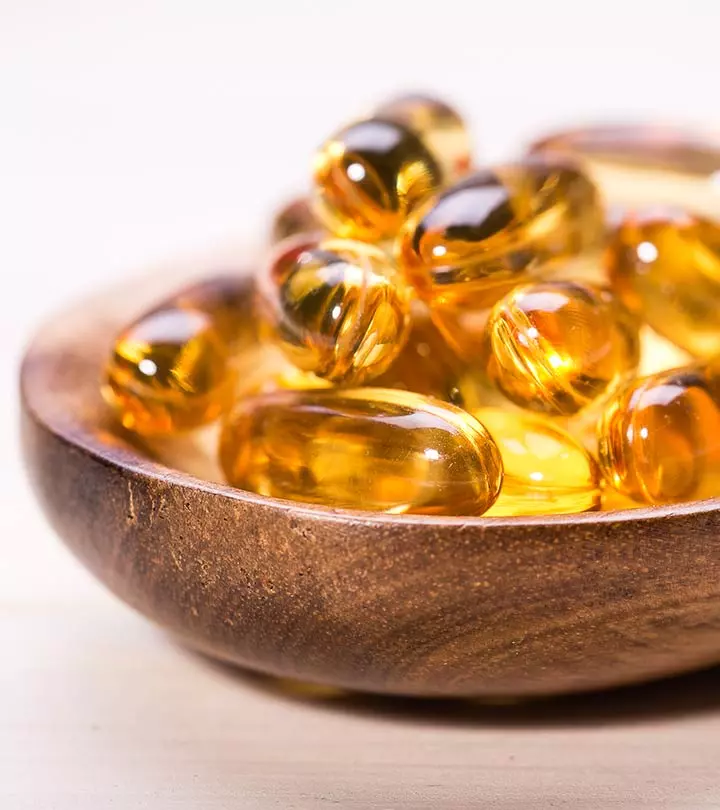


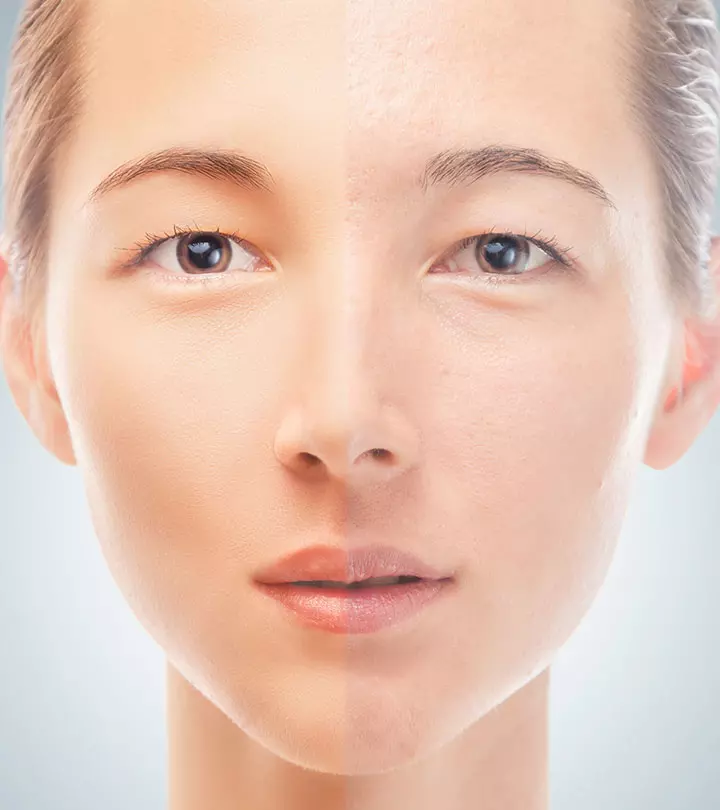




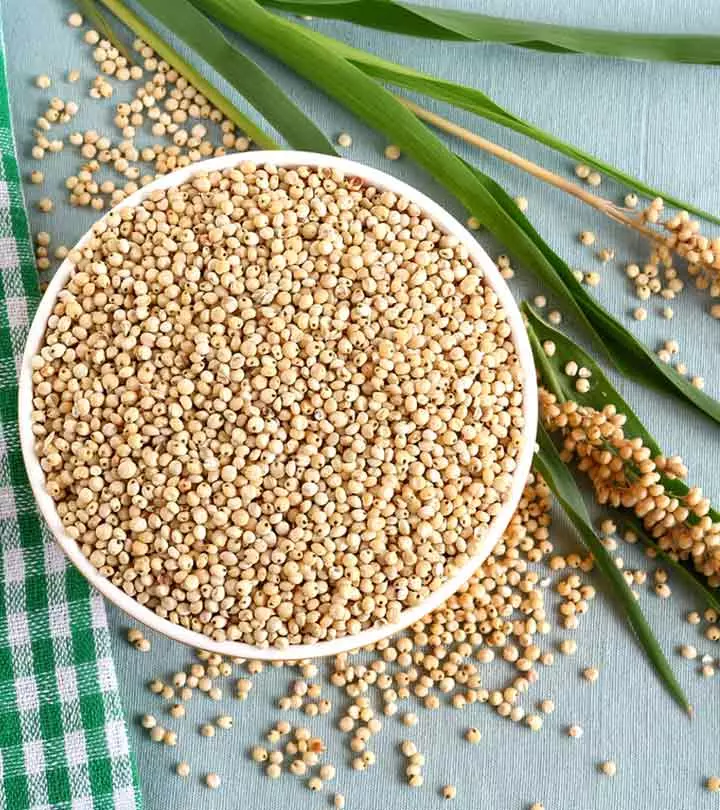





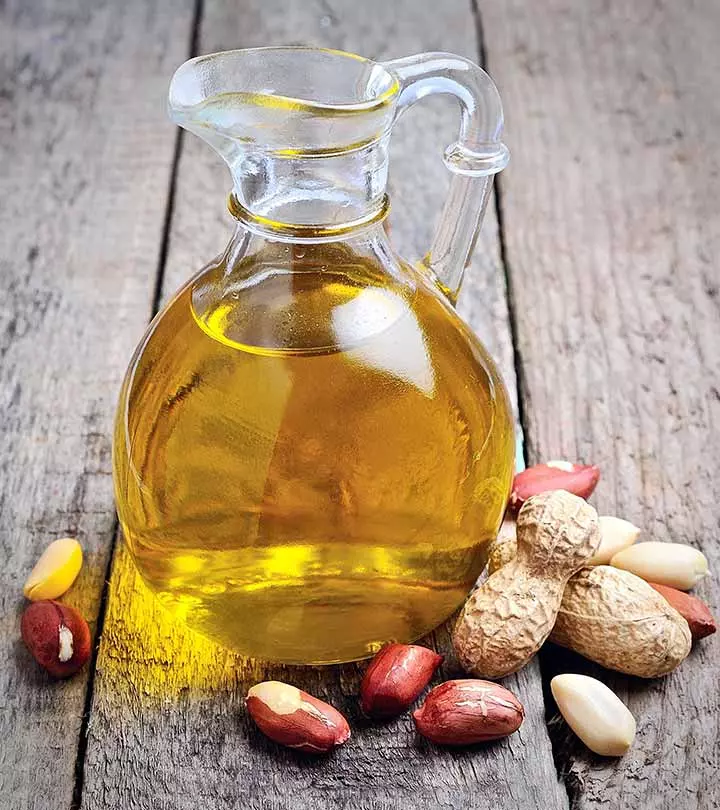


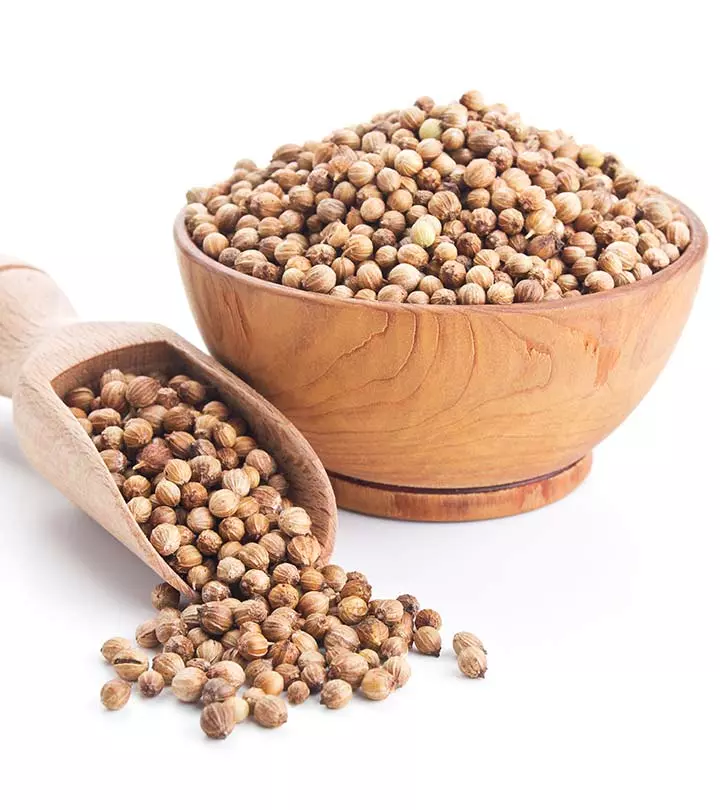
Community Experiences
Join the conversation and become a part of our empowering community! Share your stories, experiences, and insights to connect with other beauty, lifestyle, and health enthusiasts.